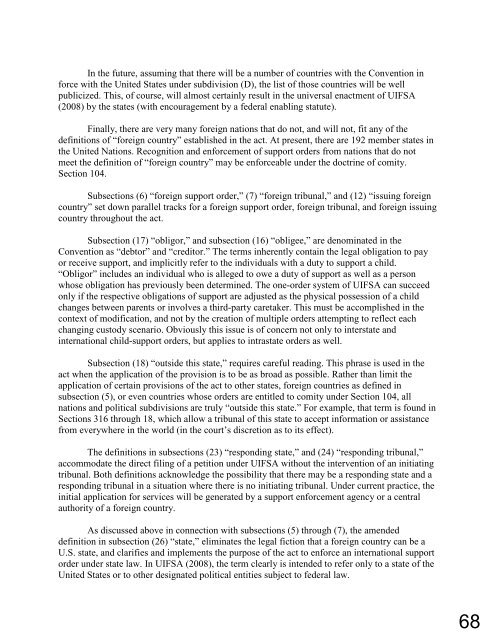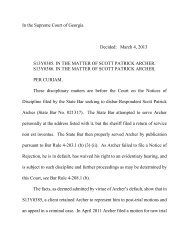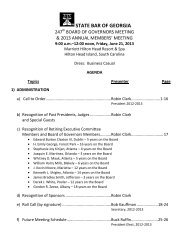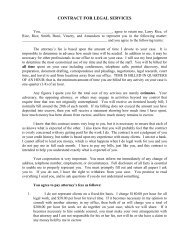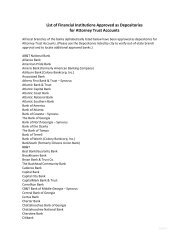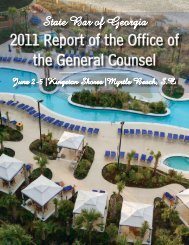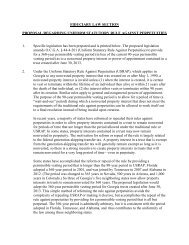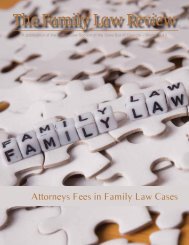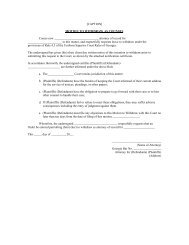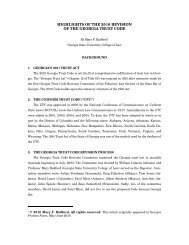2008 Amendments to the Uniform Interstate Family Support Act ...
2008 Amendments to the Uniform Interstate Family Support Act ...
2008 Amendments to the Uniform Interstate Family Support Act ...
You also want an ePaper? Increase the reach of your titles
YUMPU automatically turns print PDFs into web optimized ePapers that Google loves.
In <strong>the</strong> future, assuming that <strong>the</strong>re will be a number of countries with <strong>the</strong> Convention in<br />
force with <strong>the</strong> United States under subdivision (D), <strong>the</strong> list of those countries will be well<br />
publicized. This, of course, will almost certainly result in <strong>the</strong> universal enactment of UIFSA<br />
(<strong>2008</strong>) by <strong>the</strong> states (with encouragement by a federal enabling statute).<br />
Finally, <strong>the</strong>re are very many foreign nations that do not, and will not, fit any of <strong>the</strong><br />
definitions of “foreign country” established in <strong>the</strong> act. At present, <strong>the</strong>re are 192 member states in<br />
<strong>the</strong> United Nations. Recognition and enforcement of support orders from nations that do not<br />
meet <strong>the</strong> definition of “foreign country” may be enforceable under <strong>the</strong> doctrine of comity.<br />
Section 104.<br />
Subsections (6) “foreign support order,” (7) “foreign tribunal,” and (12) “issuing foreign<br />
country” set down parallel tracks for a foreign support order, foreign tribunal, and foreign issuing<br />
country throughout <strong>the</strong> act.<br />
Subsection (17) “obligor,” and subsection (16) “obligee,” are denominated in <strong>the</strong><br />
Convention as “deb<strong>to</strong>r” and “credi<strong>to</strong>r.” The terms inherently contain <strong>the</strong> legal obligation <strong>to</strong> pay<br />
or receive support, and implicitly refer <strong>to</strong> <strong>the</strong> individuals with a duty <strong>to</strong> support a child.<br />
“Obligor” includes an individual who is alleged <strong>to</strong> owe a duty of support as well as a person<br />
whose obligation has previously been determined. The one-order system of UIFSA can succeed<br />
only if <strong>the</strong> respective obligations of support are adjusted as <strong>the</strong> physical possession of a child<br />
changes between parents or involves a third-party caretaker. This must be accomplished in <strong>the</strong><br />
context of modification, and not by <strong>the</strong> creation of multiple orders attempting <strong>to</strong> reflect each<br />
changing cus<strong>to</strong>dy scenario. Obviously this issue is of concern not only <strong>to</strong> interstate and<br />
international child-support orders, but applies <strong>to</strong> intrastate orders as well.<br />
Subsection (18) “outside this state,” requires careful reading. This phrase is used in <strong>the</strong><br />
act when <strong>the</strong> application of <strong>the</strong> provision is <strong>to</strong> be as broad as possible. Ra<strong>the</strong>r than limit <strong>the</strong><br />
application of certain provisions of <strong>the</strong> act <strong>to</strong> o<strong>the</strong>r states, foreign countries as defined in<br />
subsection (5), or even countries whose orders are entitled <strong>to</strong> comity under Section 104, all<br />
nations and political subdivisions are truly “outside this state.” For example, that term is found in<br />
Sections 316 through 18, which allow a tribunal of this state <strong>to</strong> accept information or assistance<br />
from everywhere in <strong>the</strong> world (in <strong>the</strong> court’s discretion as <strong>to</strong> its effect).<br />
The definitions in subsections (23) “responding state,” and (24) “responding tribunal,”<br />
accommodate <strong>the</strong> direct filing of a petition under UIFSA without <strong>the</strong> intervention of an initiating<br />
tribunal. Both definitions acknowledge <strong>the</strong> possibility that <strong>the</strong>re may be a responding state and a<br />
responding tribunal in a situation where <strong>the</strong>re is no initiating tribunal. Under current practice, <strong>the</strong><br />
initial application for services will be generated by a support enforcement agency or a central<br />
authority of a foreign country.<br />
As discussed above in connection with subsections (5) through (7), <strong>the</strong> amended<br />
definition in subsection (26) “state,” eliminates <strong>the</strong> legal fiction that a foreign country can be a<br />
U.S. state, and clarifies and implements <strong>the</strong> purpose of <strong>the</strong> act <strong>to</strong> enforce an international support<br />
order under state law. In UIFSA (<strong>2008</strong>), <strong>the</strong> term clearly is intended <strong>to</strong> refer only <strong>to</strong> a state of <strong>the</strong><br />
United States or <strong>to</strong> o<strong>the</strong>r designated political entities subject <strong>to</strong> federal law.<br />
68


